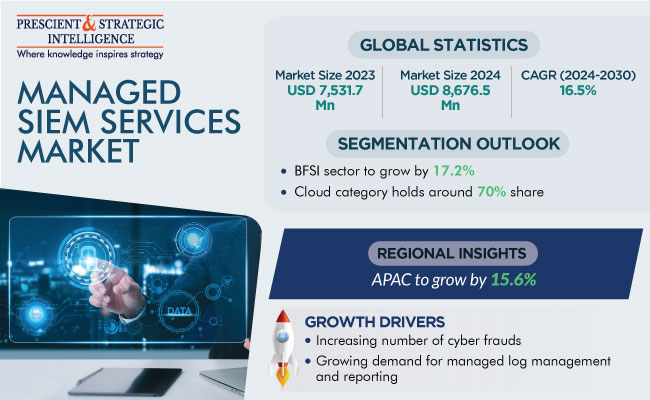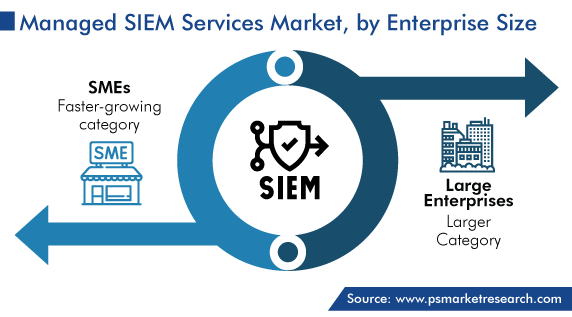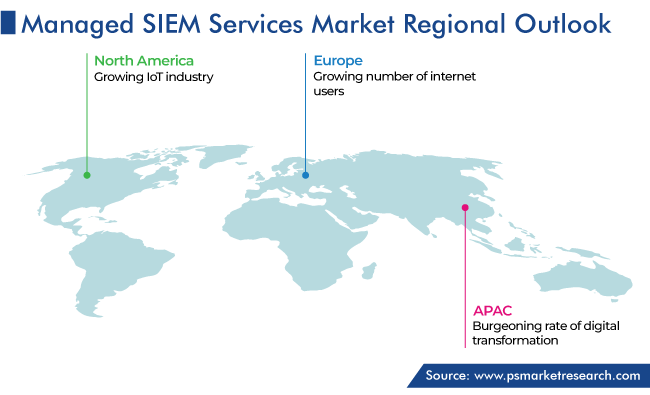Report Code: 12843 | Available Format: PDF | Pages: 220
Managed SIEM Services Market Size and Share Analysis by Type (Fully Managed, Co-Managed), Application (Log Management and Reporting, Threat Intelligence, Security Analytics), Deployment Mode (Cloud, On-Premises), Enterprise Size (SMEs, Large Enterprises), Vertical (BFSI, Government, Healthcare, Telecommunications, IT and ITes, Retail and E-Commerce, Energy and Utilities, Manufacturing) - Global Industry Growth Forecast to 2030
- Report Code: 12843
- Available Format: PDF
- Pages: 220
- Report Description
- Table of Contents
- Market Segmentation
- Request Free Sample
Managed SIEM Services Market Size & Share
The managed SIEM services market size stood at an estimated USD 7,531.7 million in 2023, and it is expected to grow at a compound annual growth rate of 16.5% during 2024–2030, to reach USD 21,707.2 million by 2030.
Security information and event management (SIEM) is a complete technology software that integrates security information management (SIM) and security event management (SEM) into a single platform. The software assists enterprises from various industries in identifying and mitigating potential security risks and threats. These solutions have become an essential cybersecurity tool for an organization as they are a centralized log system that collects, stores, analyzes, and disposes of data from all the systems linked with the organization’s network. However, the solution’s utilization to its full potential by a company’s internal IT department is quite expensive and complicated, and a large number of companies lack in-house human resources to use it.

Therefore, organizations are availing of managed SIEM services, wherein a third party manages the cybersecurity infrastructure for them. This model usually involves a team of security professionals, who deploy the required security service solution for the organization. The team analyzes and responds to the momentous alert volume the system generates, to be recognized by the security systems the service provider possesses.
Managed SIEM services include deployment, configuration, network traffic monitoring, data collection, storage, and other services, to support and augment end users’ IT security. This facility also lessens the load on in-house security teams and the total cost of ownership (TCO) associated with these solutions’ installation and maintenance. Therefore, this approach has become a crucial component of an organization's security infrastructure. This is because it provides improvised threat intelligence, immediate risk identification & response, assessment & reporting for governing compliance, and increased user transparency.
The other benefits associated with the solution are seamless integration, including information on the method of deployment anywhere, in order to collect data from networks, servers, endpoints, and cloud. Thus, by availing of such services, the organization can concentrate on its primary business, thereby improving its business efficiency.
Increase in Number of Cyber Frauds Bolsters Market Advance
The rise in the cyber fraud incidence is propelling the demand for enhanced security solutions, which, in turn, is bolstering the market. As per a U.K.-based IT Company, cyberattacks increased by 125% at the global level in 2021, compared to 2020. Among the various types of frauds—malware, phishing, ransomware, data breaches, and botnet—phishing is the most common. In 2021, more than 300,000 internet users reported being phishing victims, and nearly 80% of the firms were the target of a phishing attempt in 2022. Additionally, people from educational institutions are the most likely to open a phishing email, and the financial sector tends to come out on top, being the most-widely attacked sector by phishing. Further, SMEs experience around 300% more phishing and other cyberattacks than large enterprises.
SIEM acts as a complete technology solution, providing network monitoring & alerts round the clock, early warnings of security breaches, hidden threat information, and various other measures for the company. Further, it helps firms stay compliant, while combining information related to GDPR, PCI DSS, and ISO monitoring in one central location.
Growing Cloud Security Concerns Are another Key Market Growth Driver
Cloud deployment is one of the biggest trends among firms and organizations, as it better meets their meet business requirements. It is extensively beneficial to firms of all sizes, with advantages ranging from cost reduction to augmented business scalability. It lets firms access applications, data storage, and several other services from remote IT infrastructure, instead of maintaining the servers on-site.
However, with the continuously evolving digital landscape, cloud security threats have become more advanced. Hence, most cloud providers follow all precautions and take dynamic steps to protect their servers’ integrity. The types of cloud security solutions available include identity and access management (IAM), data loss prevention (DLP), security information and event management, business continuity management, and disaster recovery. Managed SIEM solutions offer efficiency and a wide range of security services to companies, which is why they are becoming increasingly popular.
Co-Managed Category Has Largest Revenue Share
Co-managed SIEM is a collaborative approach for security purposes, involving a partnership between the firms and managed security service providers (MSSPs). In this approach, the strengths of both the participants are integrated to provide an all-inclusive security solution, to meet the comprehensive security requirements of business. Such services provide improved threat detection, shared accountability & management, response capabilities, and some other benefits. Therefore, co-managed SIEM services are highly preferred owing to their scalability and customization benefit, which makes event management & monitoring efficient.
Along with enhanced security, this collaborative solution enables firms to adapt and grow amidst the ever-changing business environments and evolving risks and threats. Further, the service helps keep a firm’s IT personnel well-versed in security incidents, so appropriate responses can be made accordingly. In addition, it increases the user’s ability to close the security gaps in the network and safeguard sensitive information.
Companies with adequate IT resources but inadequate bandwidth to uninterruptedly monitor security actions are likely to opt for co-managed SIEM. Moreover, small enterprises are expected to use this approach to bring their operational costs down.
| Report Attribute | Details |
Market Size in 2023 |
USD 7,531.7 Million |
Market Size in 2024 |
USD 8,676.5 Million |
Revenue Forecast in 2030 |
USD 21,707.2 Million |
Growth Rate |
16.5% CAGR |
Historical Years |
2017-2023 |
Forecast Years |
2024-2030 |
Report Scope |
Market Trends, Drivers, and Restraints; Revenue Estimation and Forecast; Segmentation Analysis; Impact of COVID-19; Companies’ Strategic Developments; Market Share Analysis of Key Players; Company Profiling |
Segments Covered |
By Type, By Application; By Deployment Mode, By Enterprise Size; By Vertical; By Region |
Explore more about this report - Request free sample
Cloud Bifurcation Held Larger Revenue Share in 2023
Between on-premises and cloud-based deployment, the cloud bifurcation dominates the market with a revenue share of around 70%. This is owing to the advantages associated with the cloud, such as effective scalability, agilityapproachability, and reliability in implementing any software or workflow. Additionally, cloud deployments are gaining more attention as a large number of businesses are adopting digitally transformative strategies for smooth operations.
This category is also driven by the escalating use of hybrid (public–private) and multi-cloud systems for centralized and combined security solutions that work effortlessly and give companies the flexibility to adjust within evolving cybersecurity environments.
SMEs Are Expected To Witness Higher CAGR during Forecast Period
The SMEs bifurcation is poised to experience the higher growth rate due to the noteworthy inclination toward cybersecurity prioritization. It is because these businesses are increasingly realizing the criticality of having strong organizational safety and security measures to secure sensitive digital information and digital assets. SMEs are availing of managed services for threat detection and security monitoring, as cyber threats change and, thus, incident response approaches must too. The SMEs category is essentially driven by the increasing awareness of smaller businesses of proactive cybersecurity measures.
Further, SMEs are important to most economies, predominantly developing nations. These companies make up a significant portion of the enterprises worldwide and are significant contributors in both employment creation and economic expansion. SMEs account for more than 90% of all the businesses in several nations, which is why their growing demand for cybersecurity propels the market.

Growing Demand for Managed Log Management &Reporting
The log management & reporting category holds a significant market share globally, as these solutions centrally gather, store, correlate, analyze, and dispose of data, to provide actionable insights for performance enhancement, troubleshooting, and security monitoring. The system ingests data from the entire IT infrastructure, including cloud and on-premises servers of the company, users, apps, data sources, endpoints, cloud workloads, networks, and security solutions, such as firewalls and antivirus.
APAC To Witness Fastest Growth in Market
The managed SIEM services Market in the Asia-Pacific region is poised for the fastest growth, fueled by the burgeoning rate of digital transformation, rising cloud adoption, and expanding online connectivity. The diverse cyber threat landscape, combined with a growing awareness of cybersecurity measures, is compelling enterprises to invest in active safety solutions. Additionally, the evolving governing policies, with an increasing focus on data protection & confidentiality, is creating the necessity for wide-ranging managed SIEM services.
Additionally, with the growing number of internet users and tech-savvy consumers, the demand for data storage facilities has been increasing. As a consequence, the threat of data breaches and other cyber frauds has also been increasing. Further, the expanding BFSI, construction, food & beverages, healthcare, and other industries are adopting rigorous cybersecurity software and solutions, thus offering lucrative opportunities to service providers. Moreover, owing to the flexibility and scalability of managed SIEM services and their ability to match the security requirements of a dynamic APAC consumer base, market players are increasingly promoting their solutions here.

BFSI Category Held Largest Market Share in 2023
The BFSI sector generated global managed SIEM services market revenue is expected to showcase a CAGR of around 17.2% during the forecast period. The BFSI sector has always been more prone to cyberattacks than any other industry. As per a U.S-based cybersecurity company, BFSI institutions recorded 566 breaches in 2022, which led to over 254 million leaked records. The U.S., Argentina, China, and Brazil were the most-affected countries in terms of attacks on the BFSI industry.
With the adoption of online banking by a major chunk of the people in a large number of countries, such as India and China, the demand for cybersecurity software and services among BFSI companies continues to boom. In addition, the rollout of advanced financial models, including small banks and digital payments, coupled with major banking sector reforms, such as the rise of NBFCs that operate online, creates a robust demand for safe data storage platforms.
Key Managed SIEM Service Providers Are:
- IBM Corporation
- AT&T Inc.
- Securonix
- Splunk Inc.
- Trustwave Holdings Inc.
- UNISYS Corporation
- Optiv Security Inc.
- NTT Corporation
- NCC GROUP
- TATA Consultancy Services Limited
Report Breakdown
This fully customizable report gives a detailed analysis of the managed security information and event management services market from 2017 to 2030, based on all the relevant segments and geographies.
Types of Services
- Fully Managed
- Co-Managed
Applications of SIEM Services
- Log Management and Reporting
- Threat Intelligence
- Security Analytics
Deployment Mode
- Cloud
- On-Premises
Enterprises Analyzed
- SMEs
- Large Enterprises
Verticals Using Managed SIEM Services
- BFSI
- Government
- Healthcare
- Telecommunications
- IT and ITes
- Retail and E-Commerce
- Energy and Utilities
- Manufacturing
Regions/Countries Considered
- North America
- U.S.
- Canada
- Europe
- Germany
- U.K.
- France
- Italy
- Spain
- Asia-Pacific
- Japan
- China
- India
- South Korea
- Australia
- Latin America
- Brazil
- Mexico
- Middle East and Africa
- Saudi Arabia
- South Africa
- U.A.E.
Explore
The market or managed SIEM services valued USD 7,531.7 million in 2023.
The co-managed bifurcation has the highest managed SIEM services industry value.
The market for managed SIEM services is growing because of the rising cyberattack incidence and stringent government data security regulations.
The BFSI vertical generates the highest managed SIEM services industry revenue.
AI and digital transformation are trending in the market for managed SIEM services.
Cloud deployment is preferred in the managed SIEM services industry.
APAC is witnessing the highest CAGR in the market for managed SIEM services.
Want a report tailored exactly to your business strategy?
Request CustomizationWant an insight-rich discussion with the report author?
Speak to AnalystOur dedication to providing the most-accurate market information has earned us verification by Dun & Bradstreet (D&B). We strive for quality checking of the highest level to enable data-driven decision making for you
Our insights into the minutest levels of the markets, including the latest trends and competitive landscape, give you all the answers you need to take your business to new heights
With 24/7 research support, we ensure that the wheels of your business never stop turning. Don’t let time stand in your way. Get all your queries answered with a simple phone call or email, as and when required
We take a cautious approach to protecting your personal and confidential information. Trust is the strongest bond that connects us and our clients, and trust we build by complying with all international and domestic data protection and privacy laws